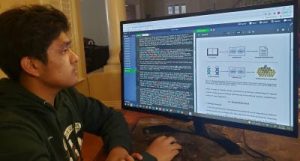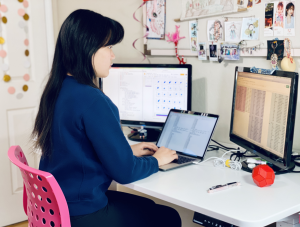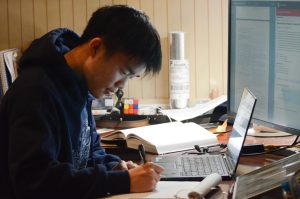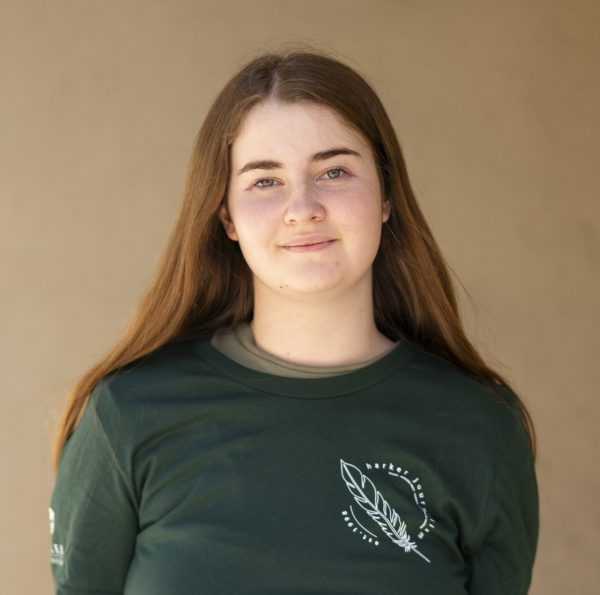Six seniors named Regeneron scholars
January 31, 2022
Seniors Alice Feng, Alex Hu, Rishab Parthasarathy, Sasvath Ramachandran, Aimee Wang and Emily Zhou have been named Regeneron Scholars for the 2022 Regeneron Science Talent Search Competition. Rishab was then named a finalist for the research competition.
Each of the scholars will each receive a cash prize of $2,000 and compete for another $1.2 million. Nearly 1,900 students participate in the Science Talent Search (STS) every year, making it one of the most competitive research contests.

Rishab’s project was titled: “A Novel Combination of Natural Language Processing (NLP) and Pathway Analysis for Predicting Oncogenic Mutation Progression and Recommending Targeted Therapies” and he researched how to apply computer science to predict what kinds of genes would mutate first and to track the progression of cancer. He hopes that his work can help recommend drugs for mutations before they happen.
“I have kind of gotten into the field of bioinformatics, which is the field of applying computer science for medicine,” Rishab said. “I was thinking about how I can use this in a way that might be unfamiliar or that might yield some unexpected benefits.”

Alice presented her project on the relationship between proteins and RNA. The title of her project is “Deep Learning Modeling of the Relationship of Protein and RNA Levels With Manifold-Preserving Regularization.”
“I chose this [topic] to research about because I have always been really interested in genetics, and this just happened to be the project I was doing this summer,” Alice said. “I really wanted to submit my best work to the competition.”
Sasvath, who worked on “Reconstructing the Meta-genome,” conducted phylogenetic analysis and genomic reconstruction on microbes found in the Deepwater Horizon oil spill. These microbes are hydrocarbon-degrading organisms that can help detoxify the oil, which is harmful to marine life.
“The crux of my research was first figuring out what the organisms were, and then piecing together the evolutionary history of these organisms in relation to others,” Sasvath said.

Aimee researched the ocean conditions of the abalone species as part of her “Monitoring Abalone in Alaska” project. She chose to study these animals because they have recently been a species of concern in multiple states, including California and Washington.
“We started collecting data from 2016, and it’s a physical process because they are underwater, and you need physical divers to go down in the ocean,” Aimee said. “Because this is a project that is so visible and in need of going through many steps, this was a very hard obstacle.”
“Computer-Assisted Detection of Intracranial Aneurysms Using a Transformer Deep Neural Network in 3D MR Angiography” was Emily Zhou’s research project, and she created a neural network capable of detecting aneurysms within 3D medical images.
“I chose this to research because I did a project on aneurysms, and I actually created an aneurysm treatment,” Emily said. “So, that was when my bio-engineering passion really started.”

Alex’s research area is in math. He researched how to simulate quantum computation on computers faster by studying stabilizer states, a certain type of quantum state. To become a Regeneron scholar or senior, the application process involves writing a paper and answering questionnaires before a student enters the competition. Even so, the rigorous application process is still meaningful.
“It helps you reflect on what you’ve done in your research and ultimately grow to become a better researcher,” Alex said.


















![“[Building nerf blasters] became this outlet of creativity for me that hasn't been matched by anything else. The process [of] making a build complete to your desire is such a painstakingly difficult process, but I've had to learn from [the skills needed from] soldering to proper painting. There's so many different options for everything, if you think about it, it exists. The best part is [that] if it doesn't exist, you can build it yourself," Ishaan Parate said.](https://harkeraquila.com/wp-content/uploads/2022/08/DSC_8149-900x604.jpg)




![“When I came into high school, I was ready to be a follower. But DECA was a game changer for me. It helped me overcome my fear of public speaking, and it's played such a major role in who I've become today. To be able to successfully lead a chapter of 150 students, an officer team and be one of the upperclassmen I once really admired is something I'm [really] proud of,” Anvitha Tummala ('21) said.](https://harkeraquila.com/wp-content/uploads/2021/07/Screen-Shot-2021-07-25-at-9.50.05-AM-900x594.png)







![“I think getting up in the morning and having a sense of purpose [is exciting]. I think without a certain amount of drive, life is kind of obsolete and mundane, and I think having that every single day is what makes each day unique and kind of makes life exciting,” Neymika Jain (12) said.](https://harkeraquila.com/wp-content/uploads/2017/06/Screen-Shot-2017-06-03-at-4.54.16-PM.png)








![“My slogan is ‘slow feet, don’t eat, and I’m hungry.’ You need to run fast to get where you are–you aren't going to get those championships if you aren't fast,” Angel Cervantes (12) said. “I want to do well in school on my tests and in track and win championships for my team. I live by that, [and] I can do that anywhere: in the classroom or on the field.”](https://harkeraquila.com/wp-content/uploads/2018/06/DSC5146-900x601.jpg)
![“[Volleyball has] taught me how to fall correctly, and another thing it taught is that you don’t have to be the best at something to be good at it. If you just hit the ball in a smart way, then it still scores points and you’re good at it. You could be a background player and still make a much bigger impact on the team than you would think,” Anya Gert (’20) said.](https://harkeraquila.com/wp-content/uploads/2020/06/AnnaGert_JinTuan_HoHPhotoEdited-600x900.jpeg)

![“I'm not nearly there yet, but [my confidence has] definitely been getting better since I was pretty shy and timid coming into Harker my freshman year. I know that there's a lot of people that are really confident in what they do, and I really admire them. Everyone's so driven and that has really pushed me to kind of try to find my own place in high school and be more confident,” Alyssa Huang (’20) said.](https://harkeraquila.com/wp-content/uploads/2020/06/AlyssaHuang_EmilyChen_HoHPhoto-900x749.jpeg)






